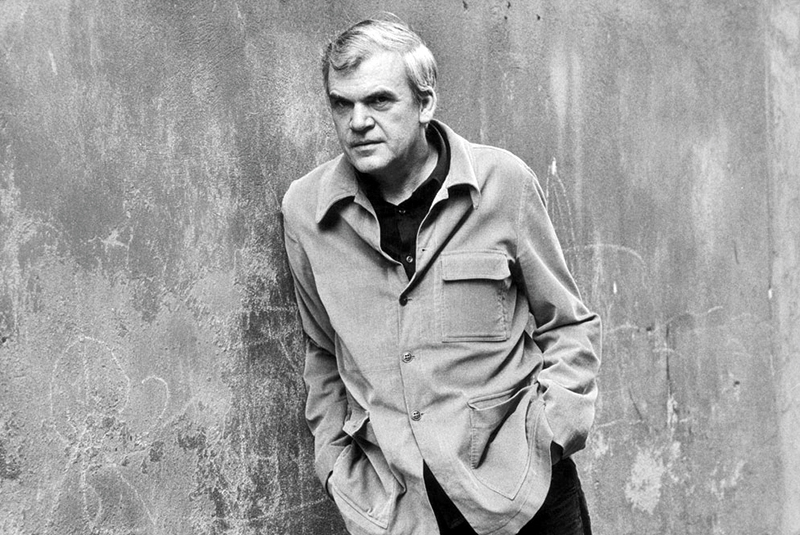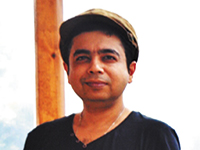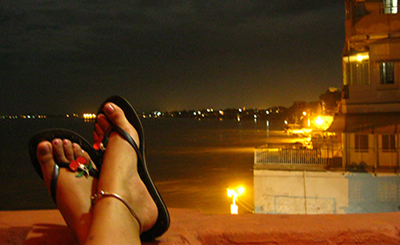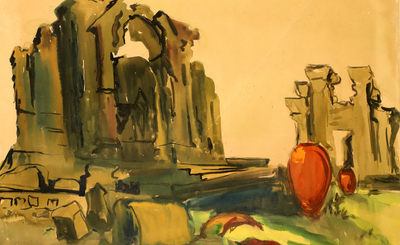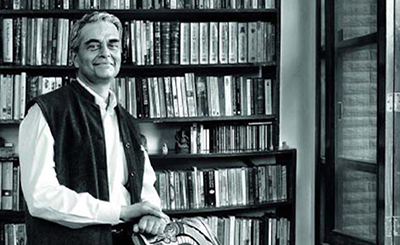1. FORGETTING OF BEING
What does it mean to read and understand a novel? Camus pointed out that we get into the habit of living before acquiring the habit of thinking. In our world of now, the habit of thought has been infected by the termites of shallowness: our joys and our sufferings have come to the surface of the vast ocean within us; we keep experiencing the waves crashing within ourselves — our restless minds — but our capacity to delve deep within — to feel the deep currents — is perhaps vanishing. Hence, how to read a novel has also been forgotten. We are too overtly concerned with our likes and dislikes, too much reduced by our conditioning and pre-conceptions, so eager to react quickly — offer alleluia or spite — that we have forgotten to travel into the world of the novel, with a blank mind freed of our own self.
The few true novels amidst the cacophony of “literary fiction” do make a demand to forget our being — to abandon ourselves briefly. Without that forgetting, the novel loses its power to penetrate deep within us, and show us, what it has to offer. The seeing suffers because of our lack of inner stillness. Understanding suffers because of our instinct to pronounce judgement. We need to get out of the way, when we are reading, and yet commit our deepest awareness that lies within us — beyond our reactions and thoughts. Allow the literature to form us in a new way, allow its life to get into us. Then only literature starts to do its magic and transforms our way of seeing, feeling and understanding.
In other words, true literature — that has layers within it, offers many ambiguous trails to invisible treasures, pulsates with the possibility of diverse meanings and contains hidden stories within the story — demands that we forget of our being, so that it can reveal to us, the truths of our being.
2. KNOWLEDGE IS THE NOVEL’S ONLY MORALITY
To make a case for the existence of terminal paradoxes in life, a term coined by Kundera, I just made a new paradoxical interpretation of the phrase “forgetting of being” — in a different context — a poetic phrase that was coined by Heidegger, who was Husserl’s pupil. These two philosophers have influenced Kundera’s understanding of the novel. Kundera writes that “the novel has accompanied man uninterruptedly and faithfully since the beginning of the Modern Era. It was then that the ‘passion to know’, which Husserl considered the essence of European spirituality, seized the novel and led it to scrutinize man’s concrete life and protect it against ‘the forgetting of being’; to hold ‘world of life’ under a permanent light. That is the sense in which I understand and share Hermann Broch’s insistence in repeating: The sole raison d’être of a novel is to discover what only the novel can discover. A novel that does not discover a hitherto unknown segment of existence is immoral. Knowledge is the novel’s only morality.”
What is Digression?
One of the most recurring elements within Kundera’s method of composing a novel is digression — which he defines as “abandoning the story for a moment”.
Kundera reveals that he has always constructed his novels “on two levels: on the first, I compose the novel’s story; over that, I develop the themes”. He defines theme as an existential enquiry that is “finally the examination of certain words, theme words”. He goes on to say, “The themes are worked out steadily within and by the story. Whenever a novel abandons its themes and settles for just telling the story, it goes flat.”
Kundera says that digression can only enhance the composition as long it stays within the arc of the theme — and can take place outside the story of the novel.
I must also digress in this part of the essay. (But this digression is not random like it might seem at the beginning; there is a subtle continuity or link to the first paragraph of this part, and eventually this digression will link up with the title of this part to justify its presence in this section and the overall theme of this essay).
I begin by picking up a single word or a motif from the first paragraph of this part — European — and wish to speak of a variation of the motif.
Kundera says “the novel is Europe’s creation; its discoveries, though made in various languages, belong to the whole of Europe.”
In a surprising twist, Kundera doesn’t use the word “Europe” as a geographical location, but uses the word only to denote a spirit of origin that is now global, and beyond the geographical limits of Europe.
For Kundera, the modern novel began in 1605 with The Ingenious Gentleman Don Quixote of La Mancha. And he declared, “I am attached to nothing but the depreciated legacy of Cervantes.”
But whether the novel is Europe’s creation is a contentious issue. Borges, in The Dialogues of Ascetic and King, called Milinda Panha (The Questions of Milinda), dating back to 100 BCE, “a novel of doctrinal intent”.
The Tale of Genji, published before 1021 by the Japanese noble woman Murasaki Shikibu, is already called in Wikipedia: “The world’s first novel, the first modern novel, the first psychological novel or the first novel still to be considered a classic.”
But perhaps more than actual history which never remains static but gets re-interpreted in time — through new revelations and removal of conscious or unconscious neglect and prejudices — what is important is the historical perception of a certain history that influences a certain individual at a certain moment of time; that for him or her is a truth. One can call it a falsified truth or a distorted truth. But it is better to call it a relative truth that is derived through one’s perception, experience, belief and understanding that is relative to one’s exposure, opportunity to know, inclinations and nature of self.
We are full of relative truths than actual truths; it is one of our existential enigmas.
Hence, “Knowledge is the Novel’s only Morality” becomes such an important dictum, ideated by Broch, that inspires Kundera.
The novel has to explore life to gather knowledge, discover a hitherto unknown segment of existence and make an attempt to take us closer to actual truths through the maze of relative truths. This is the raison d’être of the novel — the most profound reason for its existence.
3. SOMETHING PREVIOUSLY UNACHIEVED
We live in a time that Kundera describes as “a period of repetition in which the novel keeps duplicating its form, emptied of its spirit”. The spirit of the novel that he talks about is related to the sequence of discoveries, something previously unachieved.
For Kundera, the striving for the unachieved, instead of duplicating existent forms, is the marker of great literature.
“In its own way, through its own logic, the novel discovered the various dimensions of existence one by one: with Cervantes and his contemporaries, it inquires into the nature of adventure; with Richardson, it begins to examine ‘what happens inside’, to unmask the secret life of feelings; with Balzac, it discovers man’s rootedness in history; with Flaubert, it explores the terra previously incognita of the everyday; with Tolstoy, it focuses on the intrusion of the irrational into human behaviour and decisions. It probes time: the elusive past with Proust, the elusive present with Joyce. With Thomas Mann, it examines the role of the myths from the remote past that control our present actions. Et cetera, et cetera.”
Kundera tells us that the novels which seek and discover the unachieved is part of the history of the novel, and novels which don’t are outside the long history that began with Cervantes, and nothing more than “graphomania — the mania to write books (to have a public of unknown readers); not to create a form but to impose one’s self on others”. That he calls, “the most grotesque version of the will to power”.
Kundera sees form as the hallmark of originality, not only the writing. He sees the “exceptional importance of composition” as “one of the genetic markers of the art of the novel.
Kundera says, “…the beauty of a novel is inseparable from its architecture; I say ‘beauty’ because the composition is not merely a technical skill; it carries within it an author’s originality of style (all Dostoyevsky’s novels are based on the same compositional principle); and it is the identifying mark of each particular novel (inside this common principle; each of Dostoyevsky’s novels has its own inimitable architecture).”

Kundera writes, “Anna Karenina is made up of two narrative lines: Anna’s (the drama of the adultery and the suicide) and Levin’s (the life of a fairly happy couple). At the end of the seventh part, Anna kills herself. There follows the last part, the eighth, devoted exclusively to the Levin line. This is a very sharp violation of convention, because for any reader the heroine’s death is the only possible ending to a novel.” He goes on to praise Tolstoy and the composition of Anna Karenina. “…in that eighth part, the heroine is no longer onstage; all that remains of her story is a trailing echo, the light tread of a memory growing faint; and it is lovely; and it is truthful.”
With such a profound gaze upon the beauty of form and the beauty of composition, Kundera achieves the unachieved in the most splendid form of his artistic vision in The Book of Laughter and Forgetting. A novel that is a fusion of stories, memoir, meditations, novelistic essay, fable, jokes and anecdotes, where the novel is held together by a theme; and even a chapter — divided in several unrelated parts — is held together by a common question!
The same characters, or even a protagonist, are no longer required to be present in all the chapters of the novel. The theme or a question can be the thread that holds diverse elements together. He discovers a new way, forges a fresh path and makes a major contribution to our knowledge about the novel.
Kundera demonstrates what he seeks in a novel: to achieve something previously unachieved; and assures his place within the history of the novel.
4. THE GRASPING OF THE SELF
Kundera says, “All novels, of every age, are concerned with the enigma of the self. As soon as you create an imaginary being, a character, you are automatically confronted by the question: What is the self? How can the self be grasped? It is one of those fundamental questions on which the novel, as a novel is based.”
Kundera points out that there are different methods or ways to grasp the self, as one can see in the history of the novel. One can distinguish a self from others through actions and become an individual. The first European storytellers simply tell us about actions and adventures. He quotes Dante: In any act, the primary intention of the one who acts is to reveal his own image. But Kundera enumerates that four centuries after Boccaccio and his amusing tales of actions, Diderot is more sceptical: “his Jacques le Fataliste seduces his friend’s girl, he gets happily drunk, his father wallops him, a regiment marches by, out of spite he signs up, in his first battle he gets a bullet in the knee, and he limps till the day of his death. He thought he was starting an amorous adventure, and instead he was setting forth toward his infirmity. He could never recognise himself in his action. Between the act and his own self, a chasm opens. Man hopes to reveal his image through his act, but that image bears no resemble to him. The paradoxical nature of action is one of the novel’s great discoveries… So the time came when the novel, in its quest for the self, was forced to turn away from the visible world of action and examine instead interior life.”
The psychological approach wasn’t known till “the middle of the eighteenth century when Richardson discovers the form of the epistolary novel in which characters confess their thoughts and feelings”. And this exploration of the interior life opened a successive stage of evolution in the novel. “The apogee of that evolution,” says Kundera, “is to be found, it seems to me, in Proust and in Joyce. Joyce analyses something still more ungraspable than Proust’s ‘lost time’: the present moment.”
Kundera, however, says that even “the self and its uniqueness cannot be grasped in man’s interior life”. He declares, “The quest for the self has always ended, and always will end, in a paradoxical dissatisfaction. I don’t say defeat. For the novel cannot breach the limits of its own possibilities, and bringing those limits to light is already an immense discovery, an immense triumph of cognition.”
*
Kundera is sometimes propelled to enter the world of his novels as himself; and to follow his spirit — the very essence of this essay, I am also propelled to intervene here, in context of the self.
I feel that the enigma of the self cannot be solved by simply making an attempt to grasp the individual self that is in a constant state of flux. I use the term individual self because this is what Kundera means by the word self; in a different context, say Indian philosophy, the word self has a different scope of meaning, and goes beyond personalised individuality.
The individual self is always changing in real life, and some novels reflect that. Unless one is following and writing about a character from birth to death, what can be hoped is to grasp a certain point within the span of the evolution of the individual self.
However, beyond the individual self there is an invisible structure or architecture from which the individual self arises.
If the individual self is the distinct symphony that is being played by time on a piano, then the invisible common structure of human self is the piano. Without the attempt to cognize the piano — unchanging human self, the effort to cognize the symphony — changing individual self, will also end in dissatisfaction.
My own attempt in my debut novel has been to cognize the human self from which the individual self arises. The protagonist himself asks the question — what is the human self? And he sets out to understand it.
I have always been in a dialogue with authors, poets, mystics and philosophers, who inspire me. I wish to say to Kundera that the quest to grasp the self in the novel has not died — even though very few can discern the efforts being made; it is continuing and will continue — consciously and unconsciously — in the twenty first century novels; but in the language, the tone, the milieu and the realities of our new century.
The enigma of self is the most ancient of all human enigmas. Before the birth of the modern novel, the questions related to the self had occupied the poets, the mystics and the philosophers. The enigma is still not resolved, and until it is resolved, the enigma will continue to haunt us, and some would always make fresh efforts to understand it; but one must always remember that the quest is the justification, the joy, the salvation — the unlikely triumph and the likely failure, doesn’t matter.
*

Kundera speaks of a new orientation in the novel to grasp the self. “…after reaching the depth involved in the detailed exploration of the self’s interior life…it is Kafka who provided this new orientation… his way of conceiving the self is totally unexpected. What is it that defines K. as a unique being? Neither his physical appearance (we know nothing about that), nor his biography (we don’t know it), nor his name (he has none), nor his memories, his predilections, his complexes. His behaviour? His field of action is lamentably limited. His thoughts? Yes, Kafka unceasingly traces K.’s reflections, but these are bent exclusively on the current situation: What should be done then and there, in the immediate circumstances? Go to the interrogation or evade it? Obey the priest’s summons or not? All of K.’s interior life is absorbed by the situation he finds himself trapped in…he (Kafka) asks a question that is radically different: What possibilities remain for man in a world where the external determinants have become so overpowering that internal impulses no longer carry weight?”
That’s what Kundera writes in The Unbearable Lightness of Being: The novel is not the author’s confession; it is an investigation of human life in the trap the world has become.
5. MEDITATIVE INTERROGATION AS THE BASIS OF CONSTRUCTING NOVELS
Kundera thinks himself to be a novelist (explorer of existence) not a writer. Apart from 11 novels and a play, he has published four non-fiction books consisting of essays, reflections, recollections and interviews — The Art of the Novel, Testaments Betrayed, The Curtain and Encounter — where he is also exploring the novel as a distinct form of art, not simply writing, and defines the novel as “the great prose form in which an author thoroughly explores, by means of experimental selves (characters), some themes of existence”.
His erudition and insights about the novel as a novel is unmatched. He writes that there are “three elementary possibilities for the novelist: he tells a story (Fielding), he describes a story (Flaubert), he thinks a story (Musil). The nineteenth-century novel of description was in harmony with (positivist, scientific) spirit of the time. To base a novel on a sustained meditation goes against the spirit of the twentieth century, which no longer likes to think at all.”
Kundera says, “Meditative interrogation (interrogative meditation) is the basis on which all my novels are constructed.”
“What lies beyond the so-called psychological novel? Or, put another way: What is the non-psychological means to apprehend the self? To apprehend the self in my novels means to grasp the essence of its existential problem.”
Kundera takes inspiration from Broch and Kafka and he breaks the sacred conventions of writing about characters — he takes out the inessentials.
He says, “A character is not a simulation of a living being. It is an imaginary being. An experimental self… lack of information does not make him (a character) the less ‘living’. Because making a character ‘alive’ means: getting to the bottom of his existential problem. Which in turn means: getting to the bottom of some situations, some motifs, even some words that shape him. Nothing more.”
Not only the characters, but even the historical circumstances are treated parsimoniously. Kundera himself says, “I behave toward history like the stage designer who constructs an abstract set out of the few items indispensable to the action.”
“I see the art of ellipsis as crucial. It insists that we go directly to the heart of things.”
This inspiration to go straight into the heart of things comes to Kundera from the composer he admires, Leos Janacek. “My own imperative is ‘Janacekian’: to rid the novel of the automatism of novelistic technique, of novelistic verbalism; to make it dense.”
Dreams also play an important part in his novels. He says that like Kafka (and like Novalis), he also has the “same desire to bring dream — dream imagination — into the novel. My own way of doing it is not by a ‘fusion of dream and reality’ but by polyphonic confrontation.”
Kundera is as much interested in music, as he is in literature. From music he borrows the polyphonic way of composition. He says, “Polyphony in music is the simultaneous presentation of two or more voices (melodic lines) that are perfectly bound together but still keep their relative independence.” And he uses this method in his novels.
Christian Salmon helps Kundera to surmise the two archetype-forms in his novels: 1) Polyphonic composition that brings heterogeneous elements together within an architecture based on number seven; 2) farcical, homogeneous theatrical composition that verges on the improbable.
Kundera replies back in agreement: “I dream constantly of some great unexpected infidelity. But so far I have not managed to break out of my bigamy with these two forms.”
6. FUTURE POSSIBILITIES OF THE NOVEL
Kundera once said in Testaments Betrayed that he is “partway along a road, in dialogue with those who preceded me and even perhaps (but less so) with those still to come”.
The dialogue with Kundera, I believe, will continue; not “perhaps (but less so) with those still to come” as Kundera had speculated, but certainly, going by the works he has created and the possibilities he has shown and spoken about.
For Kundera, three most important novelists of the twentieth century are Kafka, Broch and Musil. He says this because he thinks that this trinity of pleiadians, not only strived for the unachieved, but also opened out possibilities for the future development of the history of the novel.

Kafka’s novels are in Kundera’s words, “Seamless fusion of dream and reality…supremely lucid gaze set on the modern world, along with the most unfettered imagination. Above all, Kafka represents an enormous aesthetic revolution. An artistic miracle.”
Kundera also admires Broch for The Sleepwalkers. “All great works (precisely because they are great) contain something unachieved. Broch is an inspiration to us not only because of what he brought off but also because of what he aimed for and missed. The unachieved in his work can show us the need for (1) a new art of radical divestment (which can encompass the complexity of existence in the modern world without losing architectonic clarity); (2) a new art of novelistic counterpoint (which can blend philosophy, narrative, and dream into one music); (3) a new art of specifically novelistic essay (which does not claim to bear an apodictic message but remains hypothetical, playful, or ironic).”
Kundera also speaks about four unheard appeals: the appeal of play (Sterne’s Tristram Shandy and Diderot’s Jacques le Fataliste which reached the heights of playfulness, of lightness, never scaled before or since); the appeal of dream (that was achieved by Kafka through his fusion of dream and reality that showed that the novel is a place where the imagination can explode as in a dream, and that the novel can break free of the seemingly inescapable imperative of verisimilitude); the appeal of thought (Musil and Broch who brought a sovereign and radiant intelligence to bear on the novel and could make of the novel the supreme intellectual synthesis); the appeal of time (to broaden the time issue to the enigma of collective time).
“But I don’t want to predict the future paths of the novel, which I cannot know; all I mean to say is this: if the novel should really disappear, it will do so not because it has exhausted its powers but because it exists in a world grown alien to it.”
Kundera goes on to say, “Like all of culture, the novel is more and more in the hands of the mass media; as agents of unification of the planet’s history, the media amplify and channel the reduction process; they distribute throughout the world the same simplifications and stereotypes easily acceptable by the greatest number, by everyone, by all mankind… This common spirit of the mass media, camouflaged by political diversity, is the spirit of our time. And this spirit to me is contrary to the spirit of the novel.”
“The novel’s spirit is the spirit of complexity. Every novel says to the reader: ‘Things are not as simple as you think.’ That is the novel’s eternal truth, but it grows steadily harder to hear amid the din of easy, quick answers that come faster than the question and block it off… and the ancient wisdom of Cervantes, telling us about the difficulty of knowing and the elusiveness of truth, seems cumbersome and useless.”
Kundera imagines in anguish a time when art shall cease to seek out the never-said and will go docilely back into the service of the collective life. That he calls, not the history of art that is perishable, but the babble of art that is eternal.
“The novel’s spirit is the spirit of continuity: each work is an answer to preceding ones, each work contains all the previous experiences of the novel. But the spirit of our time is firmly focussed on a present that is so expansive and profuse that it shoves the past off our horizon and reduces time to the present moment only. Within this system the novel is no longer a work (a thing made to last, to connect the past with the future) but one current event among many, a gesture with no tomorrow.”
In spite of his anguish Kundera says, ‘The novel form is almost boundless freedom. Throughout his history, the novel hasn’t taken much advantage of that. It has missed out on that freedom. It has left unexplored many formal possibilities.’
He also points out the future possibilities — the unanswered appeals — and wishes nothing more than the successive development of the history of the novel: to explore existence by seeking to create new forms; to strive for the unachieved.
7. THE FESTIVAL OF INSIGNIFICANCE
My novels are variants of an architecture based on the number seven,” says Kundera. But he is quick to point out that the “seven-part structure doesn’t represent some superstitious flirtation with magical numbers, or any rational calculation, but a deep, unconscious, incomprehensible drive, an archetype of form that I cannot escape.”
I could have easily escaped the number, but I consciously decided to ideate and compose this polyphonic essay in two voices — mine and Kundera (through his quotes) — in seven parts.
(To remain as close to the essential spirit of Kundera has been the conscious objective of this essay). It is almost needless to mention that Kundera’s recently released novel The Festival of Insignificance — at the age of 85 — is also set in seven chapters.
THE REVIEW
From the very first novel — The Joke — Kundera has been preoccupied by the effort to grasp the self. And his method takes inspiration from Kafka — to grasp the self through existential situations.
One of the consistent enigmas of the individual self is: in spite of the passage of time, in spite of the constant flux of change that comes through the shifts of inner impulses or externalities, there is a distinct individualistic self-pattern that accompanies us through our lives, till the very end.
Like a distinct fingerprint, there is a self-pattern that identifies us, but also provides a consistency within all the stages of our change, development and evolution.
It is the link through which the successive development of the individual self happens — within the changing “I”, the essential “me”.
There is an essential “me” and the secret message and purpose of life is to come closer to that “me”; find a path in our life that is agreeable to that “me” or can allow that “me” to express itself.
The freedom to be “me” is the most unsaid fundamental instinct of the human soul. Understanding this “me” and following the path of “me” is our prime existential struggle, and our hidden impulse behind our deepest thoughts, our decisions and our individuality.
To summarise further and to say the unsaid: from the invisible structure of the human self, arises the individual self. Within the changing individual self, there is an unchanging abstraction (also the root of our inner conflicts) — the essential “me” within the changing “I”.
These are the three layers of self that is played by the mysterious element of time — the most fundamental enigma of our existence.
Hence, even at the age of 85, the essential “me” of Kundera, the novelist, remains the same — The Festival of Insignificance falls under archetype-form of Kunderaesque novels, and is a fusion of farcical, homogeneous theatrical composition that verges on the improbable and a polyphonic composition that brings heterogeneous elements together within an architecture based on number seven — but the changing “I” of Kundera, brought about by the passage of time, takes a different look at the world, from his point of view that is also very European, and now, located in Paris, France.
In this novel, Kundera is also looking to grasp the self. But there is a development. Through the existential situations of the characters, Kundera is also trying to grasp the self of the times — its psyche and spirit; and he is doing so by also gazing upon the totalitarian regime of the past — a history he lived through in Czechoslovakia, before leaving his own country, and driving away to France, where he is living since 1975.
But Kundera is not doing so as an immigrant in exile. Kundera became a naturalised French citizen in 1981, and he “sees himself as a French writer and insists his work should be studied as French literature and classified as such in book stores”. From 1993, Kundera has only written novels and non-fiction in French. Since he prefers to live incognito and rarely speaks to the media, whether he also gives interviews only in French, is not known.
This biographical detail is essential to remember before one begins to talk about the novel — it is a view from Europe, and about Europe.

The novel is set in contemporary Paris, and the most important setting is the Luxembourg Gardens — where the theatrical finale of the novel also takes place — where “in an immense circle, stood great white statues of the queens of France; and farther still, on the grass beneath the trees, here and there in every direction, stood sculptures of poets, painters and scientists”. No one is bothered to look at the statues or to read the inscriptions on the pedestals — the strollers in the park are benignly indifferent.
Through such observations, such as the indifference to history, Kundera makes a lot of comments, throughout the novel, about the psyche of the times that he also calls — through a character — the “post-joke age”.
In the beginning of the novel, Alain, while walking slowly down a Paris street, meditates upon the changing sensibilities about female seductive power after observing “the young girls, who — every one of them — showed her naked navel between trousers belted very low and T-shirt cut very short”. And this spurs him to raise meditative questions about the enigma of the navel. Addressing the reader, Kundera says in one of the latter chapters, “I do not want to hide the fact that this enigma does preoccupy him still, the way you yourselves are preoccupied for months, if not years, by similar problems (certainly far more pointless than the one obsessing Alain).”
We arrive at the code of the novel — insignificance of life. The serious question is presented to us with the lightest of touches.
D’Ardelo lies about having cancer to Ramon, but D’Ardelo himself doesn’t know the reason for the lie. Not having a reason amuses D’Ardelo, but he takes pleasure in a good mood. Ramon inhales indifference “like a soothing calm”. Quaquelique, the womaniser, succeeds in his conquests because of “insignificance” — his method of conquest didn’t demand any “intelligent response whatever, no ready wit”. Caliban, a struggling actor, whose benefits diminished year after year, “as indeed they did for thousands of other unemployed actors, dancers, singers”, took on the role of a waiter in social events for private clients, where to amuse himself out of boredom, he takes on the random identity of being a Pakistani and speaks in a babble of meaningless sounds which he invents; and in such a party, a Portuguese maid takes a fancy for him without understanding anything Caliban was saying, and “their communication in two languages neither understood brought them close”.
The utter pointlessness of actions — and the lack of reason for them — is the primary theme of the novel — a farcical portrait of the general psyche of the contemporary times in Paris, where the primary obsession is to search for a good mood.
There is also a parallel theme of time — of mortality, of forgetting, of ageing, of generational gap, of change in meaning — running through the novel, but that too is presented under the arc of the eventual insignificance staring at all of us. Charles contemplates, “Time moves on. Because of time, first we’re alive — which is to say: indicted and convicted. Then we die, and for a few more years we live on in the people who knew us, but very soon there’s another change; the dead become the old dead, no one remembers them any longer and they vanish into the void; only a few of them, very, very rare ones, leave their names behind in people’s memories, but, lacking any authentic witness now, any actual recollection, they become marionettes.”
The totalitarian history — that Kundera himself had lived through — is represented in the novel by Stalin and his group, but the history — absolved of all seriousness by the passage of time — is presented to us as a farce, as lightly as puppet theatre.
Kundera has always been a contemporary novelist – he always wrote novels from the view of the present. In this novel he also gazes at the past from the present, and sees the fading of all significance of that history; and he does this, with a laugh.
From Khrushchev’s Memoirs an anecdote – about Stalin who once spotted twenty four partridges perched on a tree, shot down twelve of them, ran out of shells, trekked thirteen kilometres back to his house, picked up twelve more shells, returned to the spot where the twelve remaining partridges were still sitting on the tree, and finally he killed them all – becomes the beginning of an inspiration for Charles to invent a play for the marionette theatre.
If one looks closely at the other motifs which appear in the novel such as that of the mother, of daydreams and of angels, several possibilities emerge of various other meanings — chiefly of an impending doom or an utter decline in the cultural life of France, and even of Europe.
Kundera had reiterated before that the novelist is neither a historian nor a prophet, but he has used the motif of prophecy in this novel. Absence of humour in the present times is compared to the absence of humour in a totalitarian state. When an age or an era tends to lose its sense of humour, then it begins to become dangerous or begins to decline — is a dark prognosis of this novel.
This universal insight is of great value in context of India as well, where jokes about powerful politicians in social media or emails have led to police action. Those who have no sense of humour or cannot tolerate jokes about themselves are those who are not only petty revenge seekers with poor imagination, but they are the victims of egotism and have latent totalitarian impulses — which come with the allied traits: corruption, abuse of power, sycophancy and cronyism.
The uninspiring portrait of contemporary Paris in the novel might also trigger the Paris Syndrome, especially to the readers who might still have an idealized image of Paris in them. Those looking for the Paris of art, literature and culture — the smoke filled cafes with intellectuals and passionate romances — might get the transient psychological disorder that the Japanese tourists are more vulnerable to, and come to bitter reality.
The Festival of Insignificance has to be read carefully, by taking many pauses for laughter, and also for reflection. Kundera through his story of four friends in contemporary Paris — Alain, Ramon, Charles and Caliban, does more in hundred and fifteen pages, than any novelist can hope to do so in such a slim volume.
In the present climate of literary fiction — I hesitate to say literature — misery has come to be the centrality for seriousness. Misery, and also the volume of the pages — indicative of weight — have become markers of seriousness. Even a Man Booker Prize judge Michael Wood admitted in an article recently published in The Guardian that the subjects of the novels which have been shortlisted for the 2015 prize are ‘pretty grim’. In such a climate, The Festival of Insignificance is like a breath of fresh air with its lightness — both of volume and of spirit — and yet it manages to capture and reveal much more, and also raise the serious question about the significance of life itself.
Ramon contemplates and says the following at the end of the novel:
‘At this point, though, insignificance looks entirely different to me than it did back then; I see it in a whole other way – in a stronger, more revealing light. Insignificance, my friend, is the essence of existence. It is all around us, and everywhere and always. It is present even when no one wants to see it: in horror, in bloody battles, in the worst disasters. It often takes courage to acknowledge it in such dramatic situations, and to call it by name. But it is not only a matter of acknowledging it, we must love insignificance, we must learn to love it.’
There is little doubt that it is Kundera who is speaking to us through Ramon. But can we inhale the insignificance that is all around, see its beauty and learn to love it? Is it the ‘key to wisdom’ and the ‘key to a good mood’?
Often the works of literature don’t provide the answers, but raises the right questions, and forces us to reflect.
The Festival of Insignificance – the best novel that Kundera has written in French – is a delightful invitation to go for a deep reflection.
Paradoxically, it is a significant novel about insignificance — a memorable epilogue in the oeuvre of the greatest living novelist of our times, a dazzling essayist on the art of the novel and one of the finest novelists in the history of our world.
*****
All quotes of Milan Kundera, where the quotes are not indicated, are from The Art of the Novel, The Curtain and The Festival of Insignificance
